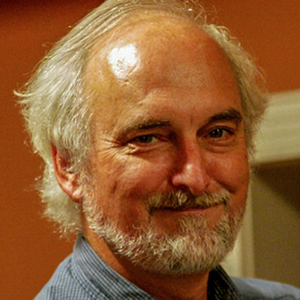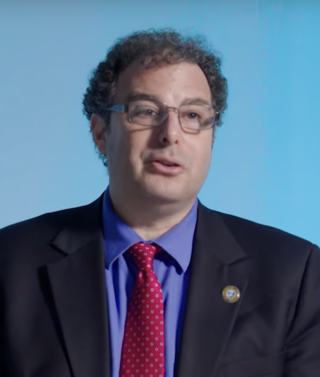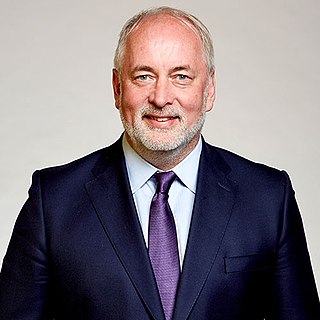Related Research Articles
Michael Irwin Jordan is an American scientist, professor at the University of California, Berkeley, research scientist at the Inria Paris, and researcher in machine learning, statistics, and artificial intelligence.

Timothy Wilking Finin is the Willard and Lillian Hackerman Chair in Engineering and is a Professor of Computer Science and Electrical Engineering at the University of Maryland, Baltimore County (UMBC). His research has focused on the applications of artificial intelligence to problems in information systems and has included contributions to natural language processing, expert systems, the theory and applications of multiagent systems, the semantic web, and mobile computing.

Michael Lederman Littman is a computer scientist, researcher, educator, and author. His research interests focus on reinforcement learning. He is currently a University Professor of Computer Science at Brown University, where he has taught since 2012.

Manuela Maria Veloso is the Head of J.P. Morgan AI Research & Herbert A. Simon University Professor Emeritus in the School of Computer Science at Carnegie Mellon University, where she was previously Head of the Machine Learning Department. She served as president of Association for the Advancement of Artificial Intelligence (AAAI) until 2014, and the co-founder and a Past President of the RoboCup Federation. She is a fellow of AAAI, Institute of Electrical and Electronics Engineers (IEEE), American Association for the Advancement of Science (AAAS), and Association for Computing Machinery (ACM). She is an international expert in artificial intelligence and robotics.
Amit Sheth is a computer scientist at University of South Carolina in Columbia, South Carolina. He is the founding Director of the Artificial Intelligence Institute, and a Professor of Computer Science and Engineering. From 2007 to June 2019, he was the Lexis Nexis Ohio Eminent Scholar, director of the Ohio Center of Excellence in Knowledge-enabled Computing, and a Professor of Computer Science at Wright State University. Sheth's work has been cited by over 48,800 publications. He has an h-index of 106, which puts him among the top 100 computer scientists with the highest h-index. Prior to founding the Kno.e.sis Center, he served as the director of the Large Scale Distributed Information Systems Lab at the University of Georgia in Athens, Georgia.
Dinesh Manocha is an Indian-American computer scientist and the Paul Chrisman Iribe Professor of Computer Science at University of Maryland College Park, formerly at University of North Carolina at Chapel Hill. His research interests are in scientific computation, robotics, self-driving cars, affective computing, virtual and augmented reality and 3D computer graphics.

Sarit Kraus is a professor of computer science at the Bar-Ilan University in Israel. She was named the 2020-2021 ACM Athena Lecturer recognising her contributions to artificial intelligence, notably to multiagent systems, human-agent interaction, autonomous agents and nonmonotonic reasoning, in addition to exemplary service and leadership in these fields.
Maja Matarić is an American computer scientist, roboticist and AI researcher, and the Chan Soon-Shiong Distinguished Professor of Computer Science, Neuroscience, and Pediatrics at the University of Southern California. She is known for her work in human-robot interaction for socially assistive robotics, a new field she pioneered, which focuses on creating robots capable of providing personalized therapy and care that helps people help themselves, through social rather than physical interaction. Her work has focused on aiding special needs populations including the elderly, stroke patients, and children with autism, and has been deployed and evaluated in hospitals, therapy centers, schools, and homes. She is also known for her earlier work on robot learning from demonstration, swarm robotics, robot teams, and robot navigation.
Nancy Marie Amato is an American computer scientist noted for her research on the algorithmic foundations of motion planning, computational biology, computational geometry and parallel computing. Amato is the Abel Bliss Professor of Engineering and Head of the Department of Computer Science at the University of Illinois at Urbana-Champaign. Amato is noted for her leadership in broadening participation in computing, and is currently a member of the steering committee of CRA-WP, of which she has been a member of the board since 2000.

Barbara J. Grosz CorrFRSE is an American computer scientist and Higgins Professor of Natural Sciences at Harvard University. She has made seminal contributions to the fields of natural language processing and multi-agent systems. With Alison Simmons, she is co-founder of the Embedded EthiCS programme at Harvard, which embeds ethics lessons into computer science courses.

Nicholas Robert Jennings is a British computer scientist and the current Vice-Chancellor and President of Loughborough University. He was previously the Vice-Provost for Research and Enterprise at Imperial College London, the UK's first Regius Professor of Computer Science, and the inaugural Chief Scientific Adviser to the UK Government on National Security. His research covers the areas of AI, autonomous systems, agent-based computing and cybersecurity.
Henry A. Kautz is a computer scientist, Founding Director of Institute for Data Science and Professor at University of Rochester. He is interested in knowledge representation, artificial intelligence, data science and pervasive computing.
Maria Gini is an Italian and American Computer Scientist in artificial intelligence and robotics. She has considerable service to the computer science artificial intelligence community and for broadening participation in computing. She was Chair of the ACM Special Interest Group in Artificial Intelligence SIGAI from 2003 to 2010. She is currently a member of the CRA-W board.

ACM SIGAI is the Association for Computing Machinery's Special Interest Group on Artificial Intelligence (AI), an interdisciplinary group of academic and industrial researchers, practitioners, software developers, end users, and students who work together to promote and support the growth and application of AI principles and techniques throughout computing. SIGAI is one of the oldest special interest groups in the ACM. SIGAI, previously called SIGART, started in 1966, publishing the SIGART Newsletter that later became the SIGART Bulletin and Intelligence Magazine.
Franco Zambonelli is a full professor in Computer Science at the University of Modena and Reggio Emilia, Italy, since 2010.

Michael John Wooldridge is a professor of computer science at the University of Oxford. His main research interests is in multi-agent systems, and in particular, in the computational theory aspects of rational action in systems composed of multiple self-interested agents. His work is characterised by the use of techniques from computational logic, game theory, and social choice theory.

Marie desJardins is an American computer scientist, known for her research on artificial intelligence and computer science education. She is also active in broadening participation in computing.
Toru Ishida is a Japanese computer scientist specializing in multi-agent systems. He has been working on action research projects including Digital City Kyoto, Intercultural Collaboration Experiments, and the Language Grid. He is a professor emeritus of Kyoto University, and currently a visiting professor of Hong Kong Baptist University.
Jiebo Luo is a Chinese-American computer scientist, the Albert Arendt Hopeman Professor of Engineering and Professor of Computer Science at the University of Rochester. He is interested in artificial intelligence, data science and computer vision.
Michael Genesereth is an American logician and computer scientist, who is most known for his work on computational logic and applications of that work in enterprise management, computational law, and general game playing. Genesereth is professor in the Computer Science Department at Stanford University and a professor by courtesy in the Stanford Law School. His 1987 textbook on Logical Foundations of Artificial Intelligence remains one of the key references on symbolic artificial intelligence. He is the author of the influential Game Description Language (GDL) and Knowledge Interchange Format (KIF), the latter of which led to the ISO Common Logic standard.
References
- ↑ "Singh named SAS Institute Distinguished Professor of Computer Science".
- ↑ "NC Computer Science: Full Professors Directory".
- ↑ "NC State Computer Science: Munindar P. Singh".
- ↑ "Munindar Singh's homepage" . Retrieved 24 April 2013.
- ↑ "IEEE - Fellow Class of 2009". Institute of Electrical and Electronics Engineers (IEEE).
- ↑ "Elected AAAI Fellows".
- ↑ "AAAS Announces Leading Scientists Elected as 2020 Fellows | American Association for the Advancement of Science". www.aaas.org. Retrieved 25 November 2020.
- ↑ "Munindar P. Singh". awards.acm.org. Retrieved 5 February 2022.
- ↑ Munindar Paul Singh at the Mathematics Genealogy Project
- ↑ "Social and Psychological Commitments in Multiagent Systems" (PDF). Retrieved 24 April 2013.
- ↑ "Agent Communication Languages: Rethinking the Principles" (PDF). Retrieved 24 April 2013.
- ↑ "IFAAMAS 2016 Influential Paper Award" . Retrieved 7 June 2016.
- ↑ "Flexible Protocol Specification and Execution: Applying Event Calculus Planning using Commitments" (PDF). Retrieved 24 April 2013.
- ↑ "Information-Driven Interaction-Oriented Programming: BSPL, the Blindingly Simple Protocol Language" (PDF). Retrieved 24 April 2013.